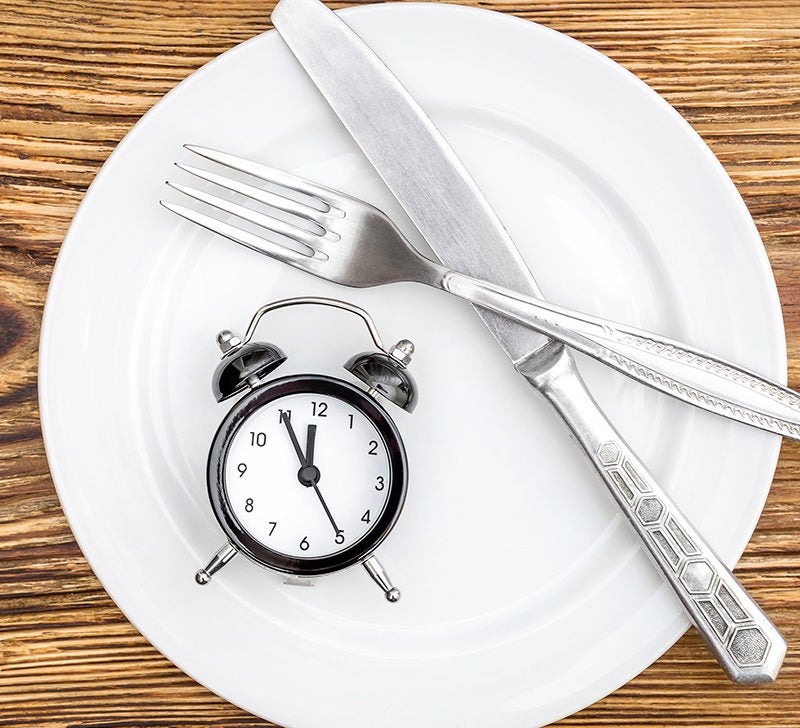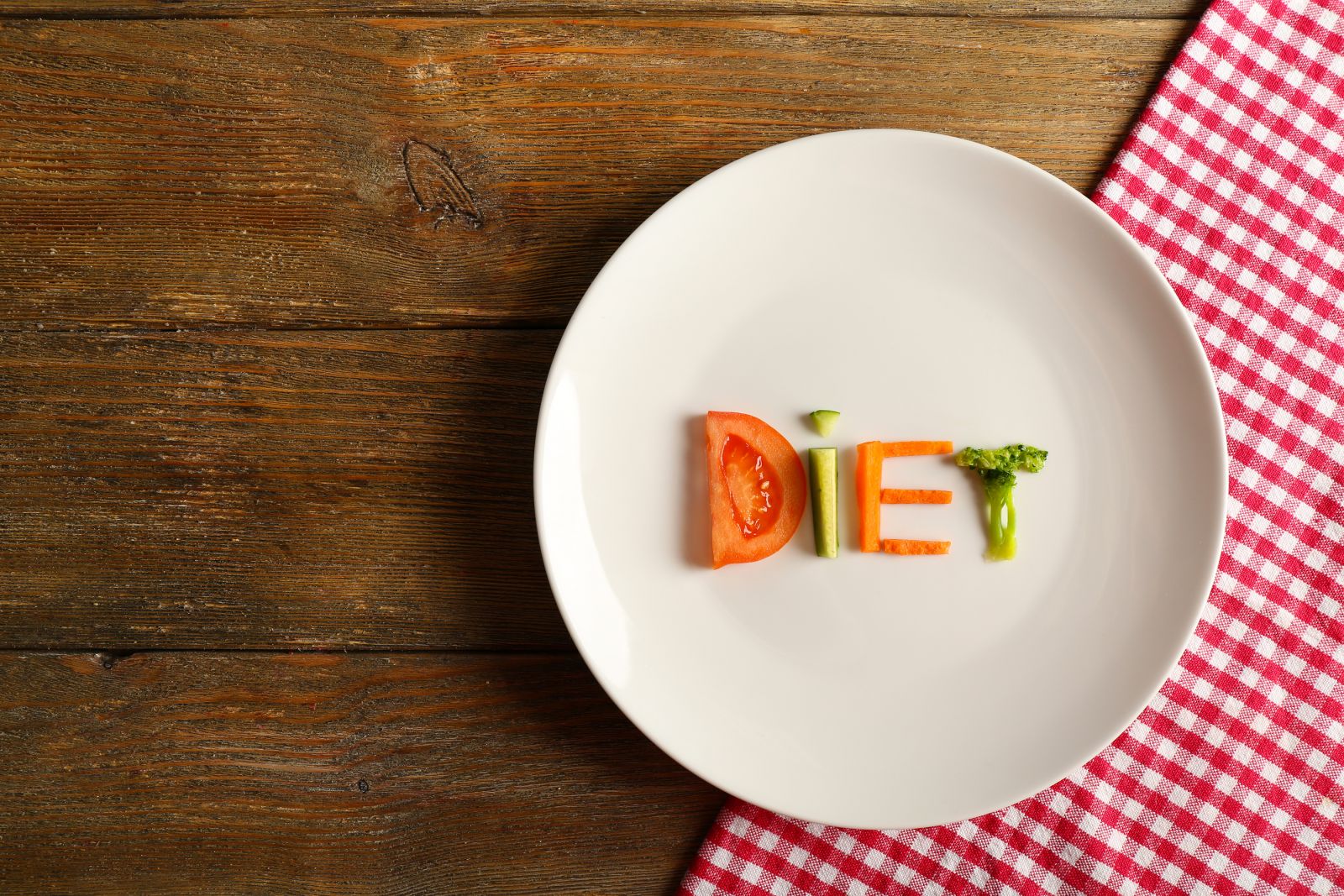Many people give tips on intermittent fasting. Some of those tips are great, and some–well–not so great. Keep reading for 10 of the WORST intermittent fasting tips, EVER!

#1 “Just Drink a Lot of Water”
Hands down, water is important for life. Most of the body is made up of water and one would die from dehydration before starvation. It can also give you some energy during fasting as well as reduce the feeling of hunger.
However, drinking too much water can certainly have some negative side-effects and it’s not actually a good idea. If you start overhydrating, you’ll end up going to the bathroom more often and excreting your electrolytes and minerals.
Losing excess sodium is one of the primary causes for refeeding syndrome. Refeeding syndrome describes rapid shifts in electrolytes that may occur in malnourished patients or when you break a fast too fast[i]. Basically, during fasting or starvation, your blood has low levels of minerals and electrolytes. When eating, you raise insulin, which is supposed to shuttle nutrients into cells. Raising insulin after a fast can cause electrolyte deficiencies, exhaustion, brain fog, hypoglycemia, arrhythmia, binge eating, and ravenous hunger because insulin depletes the blood stream from these minerals even more, leaving you deficient.
To prevent refeeding syndrome, keep your electrolyte levels high during the fast already by drinking salted water or mineral water. If you drink a modest amount of plain clean water, then you probably won’t run into issues. However, if you’re force-feeding yourself over 6-8 cups of water, then you will become low in sodium, thus increasing cramping and refeeding syndrome.
#2 “Consume Sugar During the Fasted Window”

Glucose is the body’s primary fuel source and it is needed primarily for stabilizing blood sugar levels, high intensity exercise and regulating some other reactions in the body. While fasting, your blood sugar levels will get quite low, especially after the 16-20-hour mark. This can cause some symptoms of hypoglycemia, such as fatigue, feeling of faint, lethargy and even loss of consciousness.
However, consuming some sugar whether from a juice or just regular table sugar is likely not a good idea while fasting. It will keep the body in a state of hypoglycemic dependency for longer by preventing the process of burning fat. While fasting, your body will eventually switch from burning glucose into burning fat and ketosis, which describes the process of ketosis. This shift will not happen if you keep consuming sugar or carbs, at least during the fasted state.
Thus, you will keep your body in an energy-deprived state, trying to produce energy from sugar. To create that sugar, you will start to convert your muscle tissue and protein into glucose through the process of gluconeogenesis. That’s a very stressful and catabolic process that is completely avoidable.
Ketone bodies have an anti-catabolic effect that reduce muscle catabolism while covering the vast majority of your energy demands[ii]. Ketone bodies have also been shown to attenuate muscle wasting in models of atrophy like cancer cachexia[iii]. So, you actually want and should be in ketosis during the fasted state to prevent muscle catabolism as well as give yourself adequate energy in the absence of food. Our body fat has thousands and thousands of calories that we can all use if we go into ketosis. It’s just that people stop that process by eating too many carbs or consuming sugar during the fasted window.
#3 “Don’t Do Anything Physical”
While it is true that your strength and speed will probably be a bit lower during fasting because you haven’t eaten anything. The limited glycogen may also be a factor to this, especially when it comes to explosive movements.

However, you should not be completely sedentary in the fasted state and sit on the couch all day. You can still do some low intensity physical movement like walking, hiking or yoga. It’s actually a great way to speed up the process of going into ketosis by burning through some of your liver glycogen.
#4 “Fast for As Long As Possible”
When it comes to fasting, more is not always better. Sometimes you are actually better off with keeping the fast shorter. You definitely should not have the mentality of trying to constantly fast for as long as possible because it will eventually stop working.
If you fast for 3 days in a row back to back all the time, then your body will get used to it. The body is always trying to preserve as much energy as possible. As a result, you’ll experience metabolic adaptation – the metabolism slows down a little bit to accommodate that kind of fasting. Then you have to keep pushing it further and fast for longer to start seeing the benefits again. That’s why it is more beneficial to think about least amount of time you can fast to still get benefits, instead of how long to fast.
Fasting is a hormetic stressor, which is a dose-specific response. Not enough stimulus and you won’t see any results, but too much stimulus and you’ll do more harm than good. The optimal dose varies between people but generally, 14 hours of daily time restricted eating is the is the minimal recommendation. Sidenote: Some people also do great on one meal a day (OMAD), but just because the fasting window is longer, does not make it superior.
#5 “Always Stick to the Same Window”
Similar to the previous (worst) you don’t to do the same thing all the time. It is true that sticking to the same meal timing and frequency is generally good in terms of your circadian rhythms and metabolism. However, changing things up every once in a while is also great for causing positive stress.

You can do it quite easily by just either breaking the fast a few hours earlier on some days or adding an additional meal whenever you feel like you’ve hit a plateau. Going for a longer fast is also a great way to change it up and cause more hormesis. I don’t deliberately schedule days where I change my fasting window because I’ll wait for it to happen by itself. There are some days where you just can’t have your regular fasting window or it’s more convenient to change it up. So, having a few cases for randomness is actually a good thing.
#6 “Add a Lot of Low Calorie Drinks”
Things like coffee and teas don’t break a fast. They actually enhance the effects of the fast by promoting ketosis, autophagy and other beneficial processes in the body.
However, you can definitely start adding too many of these low calorie drinks – different juices, diet sodas, bone broth, coconut water, etc. A little bit of it is probably just fine but once you start increasing the quantity, then what’s the point of fasting? One to two low calorie drinks to help you through the fast it’s fine, but you should not have them all the time. If they help you to stick to a calorie deficit and lose weight, they’re just fine but psychologically you may become dependent on them.
#7 “Break the Fast With Whatever You’d Like”
Fasting is great for fat loss because you’ll be able to eat more food within a smaller time window. Of course, you need to stay at a calorie deficit but this makes it feel like you’re not actually dieting.

You can get away with eating more junk food with IF because you have more calories to play with. However, that doesn’t mean you should.
Breaking the fast with processed food, raw kale, or a gallon of milk is not the best idea. They may cause some digestive issues or bloating. Eating “whatever” can also become an obsession and eating disorder.
To not mess up breaking the fast, it’s best to start with something that has more digestive enzymes and nutrients such as fermented foods, apple cider vinegar, veggie broth or fruit. This wakes up the gut and satiates you sooner than starting to immediately eat whatever is in sight.
#8 “Disregard Calories”
The best thing about intermittent fasting is that you can easily maintain a calorie deficit and not gain weight. However, you can still gain weight by eating too many calories even when doing one meal a day or alternate day fasting.
Calories are still the most important determinant of whether or not you lose or gain weight. Fasting is a tool for achieving a calorie deficit but it doesn’t make you magically burn more calories or prevent you from gaining fat.
You don’t have to count calories to lose weight but the underlying thermodynamics is still determining your weight loss or gain. That’s why you have to at least be mindful of that. If you eat normally and practice moderation, it’s very easy to lose weight with intermittent fasting. Sticking to primarily whole foods would also make it easy.
#9 “Drop Your Calories Very Low”
Fasting itself won’t slow down your metabolic rate. However, eating at a serious calorie deficit for too long will.
If you drop your calories too much because of wanting to lose weight fast or not being that hungry, then your body will eventually adapt and it becomes harder to continue losing weight. That’s why constant dieting will result at a slower metabolism.

To avoid metabolic adaptation, you want to progressively reduce your calories and try to eat as much as you can still lose weight with. You should also cycle days of low calorie intake with higher ones because it keeps the metabolism up.
#10 “Eat Right Before Bed”
Most intermittent fasting schedules are structured around skipping breakfast, maybe having some lunch and then eating mostly dinner. That’s what a lot of people find easier and more sustainable.
There is nothing wrong with eating in the evening as long as it’s not going to interfere with weight loss or your sleep quality. It’s just that if you eat too close to bedtime you’ll probably see worse results.
Stop food intake at least 2 hours before going to bed. Some people can’t fall asleep on an empty stomach and it’s fine to have a small snack of protein and fats but it shouldn’t be a large meal.
Avoid Bad Intermittent Fasting Tips
Intermittent fasting is simple if you follow the right advice and give yourself some time to adapt. Making mistakes is a part of the process but you can easily avoid the biggest pitfalls by learning from the mistakes of others.
References:
[i] https://www.ncbi.nlm.nih.gov/pmc/articles/PMC2440847/
[ii] Koutnik, A. P., D’Agostino, D. P., & Egan, B. (2019). Anticatabolic Effects of Ketone Bodies in Skeletal Muscle. Trends in endocrinology and metabolism: TEM, 30(4), 227–229. https://doi.org/10.1016/j.tem.2019.01.006
[iii] Koutnik, A. P., Poff, A. M., Ward, N. P., DeBlasi, J. M., Soliven, M. A., Romero, M. A., Roberson, P. A., Fox, C. D., Roberts, M. D., & D’Agostino, D. P. (2020). Ketone Bodies Attenuate Wasting in Models of Atrophy. Journal of cachexia, sarcopenia and muscle, 11(4), 973–996. https://doi.org/10.1002/jcsm.12554
Article Info Source: Siim Land
———————————
Interested in more fasting info? Check out these articles:
The Ultimate Health Benefits of Fasting
Homemade Electrolyte Drink for Extended Fasting
9 Drinks You Can Have Without Breaking Your Fast
How to Naturally Balance Hormones with Fasting
Can Fasting Be the Cause of Your Hair Loss?
Not ready for Intermittent fasting, yet? Try a juice fast! Click here





[…] 10 Intermittent Fasting Tips You Should NOT Follow […]